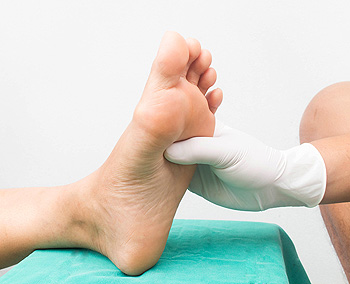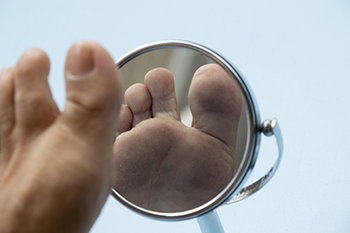Items filtered by date: September 2024
What Can Cause Toe Pain?

Toe pain can stem from various conditions with distinct characteristics. Osteoarthritis, a degenerative joint disease, can cause pain and stiffness in the toe joints as cartilage wears away over time. Gout, a form of arthritis caused by uric acid crystals, often affects the big toe leading to sudden and intense pain, redness, and swelling. Turf toe, an injury common in athletes, results from hyperextension of the big toe and can cause pain and swelling at the base of the toe. Additionally, fractures, or broken toes, may occur from trauma or excessive stress, resulting in sharp pain, bruising, and difficulty moving the toe. If you have developed toe pain, it is suggested that you consult a podiatrist who can accurately diagnose the cause and provide the appropriate treatment solutions.
Toe pain can disrupt your daily activities. If you have any concerns, contact Dr. Thomas E. Silver of Westwood Foot Clinic. Our doctor can provide the care you need to keep you pain-free and on your feet.
What Causes Toe Pain?
Most severe toe pain is caused due to a sports injury, trauma from dropping something heavy on the toe, or bumping into something rigid. Other problems can develop over time for various reasons.
Toe pain can be caused by one or more ailments. The most common include:
- Trauma
- Sports injury
- Wearing shoes that are too tight
- Arthritis
- Gout
- Corns and calluses
- Hammertoe
- Bunions
- Blisters
- Ingrown toenails
- Sprains
- Fractures (broken bones)
- Dislocations
When to See a Podiatrist
- Severe pain
- Persistent pain that lasts more than a week
- Signs of infection
- Continued swelling
- Pain that prevents walking
Diagnosis
In many cases the cause of toe pain is obvious, but in others, a podiatrist may want to use more advanced methods to determine the problem. These can range from simple visual inspections and sensation tests to X-rays and MRI scans. Prior medical history, family medical history, and any recent physical traumatic events will all be taken into consideration for a proper diagnosis.
Treatment
Treatments for toe pain and injuries vary and may include shoe inserts, padding, taping, medicines, injections, and in some cases, surgery. If you believe that you have broken a toe, please see a podiatrist as soon as possible.
If you have any questions please feel free to contact our office located in Golden Valley, MN . We offer the newest diagnostic tools and technology to treat your foot and ankle needs.
Causes of Achilles Tendon Injuries

The Achilles tendon links your calf muscles to your heel and is extremely susceptible to injuries, especially in people who are physically active. Achilles tendinopathy involves chronic microtears in the tendon. Acute ruptures occur when the tendon may partially or fully tear, which may feel like a sudden blow to the ankle. Symptoms range from pain and stiffness in the back of the heel to swelling and difficulty walking. Contributing factors include sudden increases in activity, wearing poor footwear, and tight calf muscles. Relief often involves keeping weight off the affected ankle, which may require crutches. Stretching and strengthening exercises and orthotics or foot taping can also provide support. In cases of a complete tear, urgent medical attention is required, and a podiatrist might recommend wearing a specially fitted boot to control ankle movement. If you have injured your Achilles tendon, it is suggested that you schedule an appointment with a podiatrist for an exam, diagnosis, and treatment options.
Achilles tendon injuries need immediate attention to avoid future complications. If you have any concerns, contact Dr. Thomas E. Silver of Westwood Foot Clinic. Our doctor can provide the care you need to keep you pain-free and on your feet.
What Is the Achilles Tendon?
The Achilles tendon is a tendon that connects the lower leg muscles and calf to the heel of the foot. It is the strongest tendon in the human body and is essential for making movement possible. Because this tendon is such an integral part of the body, any injuries to it can create immense difficulties and should immediately be presented to a doctor.
What Are the Symptoms of an Achilles Tendon Injury?
There are various types of injuries that can affect the Achilles tendon. The two most common injuries are Achilles tendinitis and ruptures of the tendon.
Achilles Tendinitis Symptoms
- Inflammation
- Dull to severe pain
- Increased blood flow to the tendon
- Thickening of the tendon
Rupture Symptoms
- Extreme pain and swelling in the foot
- Total immobility
Treatment and Prevention
Achilles tendon injuries are diagnosed by a thorough physical evaluation, which can include an MRI. Treatment involves rest, physical therapy, and in some cases, surgery. However, various preventative measures can be taken to avoid these injuries, such as:
- Thorough stretching of the tendon before and after exercise
- Strengthening exercises like calf raises, squats, leg curls, leg extensions, leg raises, lunges, and leg presses
If you have any questions please feel free to contact our office located in Golden Valley, MN . We offer the newest diagnostic tools and technology to treat your foot and ankle needs.
Effective Diabetic Foot Care

Good diabetic foot care is vital for preventing complications and maintaining overall health. Regular inspection of the feet is crucial, as diabetes can reduce sensation and make it difficult to notice injuries or changes. Feet should be washed daily with mild soap and water, and thoroughly dried, especially between the toes, to prevent fungal infections. Moisturizing the feet helps to prevent dryness and cracking, but should avoid the areas between the toes. Wearing properly fitted shoes is essential to prevent blisters and sores, and routine checks by a podiatrist can catch potential issues early. It is important to avoid walking barefoot to reduce the risk of injury. Additionally, managing blood sugar levels effectively contributes to better foot health. If you have diabetes, it is strongly suggested that you are under the care of a podiatrist who can routinely provide foot health checks, and help you to manage this condition.
Diabetic foot care is important in preventing foot ailments such as ulcers. If you are suffering from diabetes or have any other concerns about your feet, contact Dr. Thomas E. Silver from Westwood Foot Clinic. Our doctor can provide the care you need to keep you pain-free and on your feet.
Diabetic Foot Care
Diabetes affects millions of people every year. The condition can damage blood vessels in many parts of the body, especially the feet. Because of this, taking care of your feet is essential if you have diabetes, and having a podiatrist help monitor your foot health is highly recommended.
The Importance of Caring for Your Feet
- Routinely inspect your feet for bruises or sores.
- Wear socks that fit your feet comfortably.
- Wear comfortable shoes that provide adequate support.
Patients with diabetes should have their doctor monitor their blood levels, as blood sugar levels play such a huge role in diabetic care. Monitoring these levels on a regular basis is highly advised.
It is always best to inform your healthcare professional of any concerns you may have regarding your feet, especially for diabetic patients. Early treatment and routine foot examinations are keys to maintaining proper health, especially because severe complications can arise if proper treatment is not applied.
If you have any questions please feel free to contact our office located in Golden Valley, MN . We offer the newest diagnostic and treatment technologies for all your foot and ankle needs.
Prevention of Diabetic Foot Infections

Preventing diabetic foot infections is imperative for individuals with diabetes, as they are more prone to sores and wounds on their feet. High blood sugar levels can damage nerves, leading to neuropathy, and reduce blood flow, making it harder for injuries to heal and increasing the risk of infection. Without proper care, even small cuts or blisters can develop into serious infections. To prevent these issues, diabetic patients should perform daily foot inspections, checking for any cuts, redness, or swelling. Moisturizing regularly can help to prevent dry, cracked skin that can become infected. Wearing properly fitting shoes that do not cause pressure points or blisters is essential, as is keeping feet clean and dry. Avoiding extreme temperatures protects against burns or frostbite, which can go unnoticed due to nerve damage. Nails should be cut straight across to prevent ingrown nails, which can also become infected. If you have diabetes, it is strongly suggested that you make regular appointments with a podiatrist to manage your foot health and address any concerns before they escalate.
Wound care is an important part in dealing with diabetes. If you have diabetes and a foot wound or would like more information about wound care for diabetics, consult with Dr. Thomas E. Silver from Westwood Foot Clinic. Our doctor will assess your condition and provide you with quality foot and ankle treatment.
What Is Wound Care?
Wound care is the practice of taking proper care of a wound. This can range from the smallest to the largest of wounds. While everyone can benefit from proper wound care, it is much more important for diabetics. Diabetics often suffer from poor blood circulation which causes wounds to heal much slower than they would in a non-diabetic.
What Is the Importance of Wound Care?
While it may not seem apparent with small ulcers on the foot, for diabetics, any size ulcer can become infected. Diabetics often also suffer from neuropathy, or nerve loss. This means they might not even feel when they have an ulcer on their foot. If the wound becomes severely infected, amputation may be necessary. Therefore, it is of the upmost importance to properly care for any and all foot wounds.
How to Care for Wounds
The best way to care for foot wounds is to prevent them. For diabetics, this means daily inspections of the feet for any signs of abnormalities or ulcers. It is also recommended to see a podiatrist several times a year for a foot inspection. If you do have an ulcer, run the wound under water to clear dirt from the wound; then apply antibiotic ointment to the wound and cover with a bandage. Bandages should be changed daily and keeping pressure off the wound is smart. It is advised to see a podiatrist, who can keep an eye on it.
If you have any questions, please feel free to contact our office located in Golden Valley, MN . We offer the newest diagnostic and treatment technologies for all your foot care needs.

